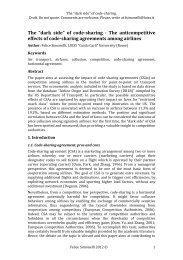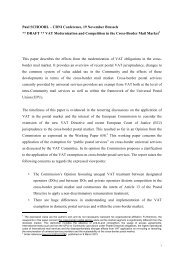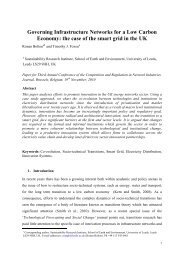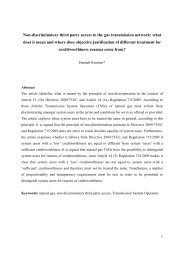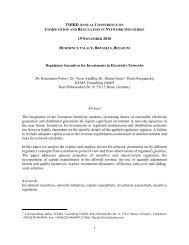The legal framework of services of general economic interest in the ...
The legal framework of services of general economic interest in the ...
The legal framework of services of general economic interest in the ...
Create successful ePaper yourself
Turn your PDF publications into a flip-book with our unique Google optimized e-Paper software.
Member States <strong>in</strong>tend to protect. <strong>The</strong> second is <strong>the</strong> bus<strong>in</strong>ess <strong>of</strong> <strong>the</strong> service production and delivery,<br />
submitted to <strong>the</strong> government control, which is necessary for <strong>the</strong> protection <strong>of</strong> <strong>the</strong> public <strong><strong>in</strong>terest</strong><br />
itself.<br />
Services <strong>of</strong> <strong>general</strong> <strong>economic</strong> <strong><strong>in</strong>terest</strong> are a subset <strong>of</strong> <strong>the</strong> wide category <strong>of</strong> <strong>services</strong>, which<br />
differs <strong>in</strong> <strong>the</strong> accomplishment <strong>of</strong> a particular public <strong><strong>in</strong>terest</strong>. <strong>The</strong>ir release is considered an essential<br />
public task that can be performed <strong>in</strong> two possible manners. <strong>The</strong> first is more restrictive <strong>in</strong> scope and<br />
<strong>in</strong>volves <strong>the</strong> assessment <strong>of</strong> possible exemptions from market rules, as set <strong>in</strong> art. 106, para. 2 TFEU.<br />
<strong>The</strong> second has a higher impact and consists <strong>in</strong> <strong>the</strong> imposition <strong>of</strong> some specific activities, with <strong>the</strong><br />
obligation to ensure a core <strong>of</strong> non-remunerative <strong>services</strong>, whe<strong>the</strong>r Member States consider that <strong>the</strong><br />
market can guarantee <strong>the</strong> related benefits 9 .<br />
This evaluation, both political and <strong>economic</strong>al, is based on three elements. <strong>The</strong> first is <strong>the</strong><br />
qualification <strong>of</strong> an <strong><strong>in</strong>terest</strong> as essential and necessary for <strong>the</strong> <strong>in</strong>volved society. <strong>The</strong> second is <strong>the</strong><br />
identification <strong>of</strong> <strong>the</strong> bus<strong>in</strong>ess that can be considered functional to <strong>the</strong> preservation <strong>of</strong> that <strong><strong>in</strong>terest</strong>.<br />
<strong>The</strong> third is <strong>the</strong> evaluation <strong>of</strong> <strong>the</strong> micro<strong>economic</strong> implications <strong>of</strong> <strong>the</strong> role <strong>of</strong> <strong>the</strong> market and <strong>the</strong><br />
exceptions to <strong>the</strong> rules laid down by <strong>the</strong> European legislation.<br />
However, Member State’s autonomy <strong>in</strong> <strong>the</strong>se assessments meets with <strong>the</strong> strict limits<br />
imposed by <strong>the</strong> Treaty, which identifies <strong>the</strong> free market system as <strong>the</strong> most appropriate means to<br />
achieve <strong>economic</strong> efficiency. Among <strong>the</strong> <strong><strong>in</strong>terest</strong>s to be protected by public authorities, those hav<strong>in</strong>g<br />
<strong>economic</strong> nature must be excluded.<br />
Member State’s freedom to identify <strong>services</strong> <strong>of</strong> <strong>general</strong> <strong>economic</strong> <strong><strong>in</strong>terest</strong> is greatly limited<br />
when consider<strong>in</strong>g that <strong>the</strong>y cannot be guaranteed by <strong>the</strong> market. If <strong>the</strong> latter can assure certa<strong>in</strong><br />
benefits, <strong>the</strong> fact that <strong>the</strong> authorities place <strong>the</strong>m at <strong>the</strong> level <strong>of</strong> public <strong><strong>in</strong>terest</strong> and support <strong>the</strong>ir<br />
supply with governmental f<strong>in</strong>ancial resources would be <strong>in</strong> clear contradiction with <strong>the</strong> spirit <strong>of</strong> <strong>the</strong><br />
Treaty.<br />
<strong>The</strong> content <strong>of</strong> <strong>services</strong> <strong>of</strong> <strong>general</strong> <strong>economic</strong> <strong><strong>in</strong>terest</strong> <strong>of</strong>ten comes from national traditions<br />
concern<strong>in</strong>g public <strong>services</strong>. Protocol no. 26 <strong>of</strong> <strong>the</strong> Treaty <strong>of</strong> Lisbon recognises «<strong>the</strong> diversity<br />
between various <strong>services</strong> <strong>of</strong> <strong>general</strong> <strong>economic</strong> <strong><strong>in</strong>terest</strong> and <strong>the</strong> differences <strong>in</strong> <strong>the</strong> needs and<br />
preferences <strong>of</strong> users that may result from different geographical, social or cultural situations».<br />
From this po<strong>in</strong>t <strong>of</strong> view, <strong>the</strong> European concept receives substance from <strong>the</strong> national <strong>legal</strong> order and,<br />
at <strong>the</strong> same time, returns a wider mean<strong>in</strong>g. <strong>The</strong> effectiveness <strong>of</strong> this operation is shown even though<br />
it fears <strong>the</strong> risk <strong>of</strong> forgett<strong>in</strong>g that <strong>the</strong> concept <strong>of</strong>fered at European level is <strong>the</strong> result <strong>of</strong> concepts that<br />
seem, <strong>in</strong> many circumstances, its anti<strong>the</strong>sis.<br />
Special attention should be paid to <strong>the</strong> considerable difficulties which occur when<br />
circumscrib<strong>in</strong>g <strong>the</strong> boundaries <strong>of</strong> <strong>the</strong> category <strong>of</strong> <strong>services</strong> <strong>of</strong> <strong>general</strong> <strong>economic</strong> <strong><strong>in</strong>terest</strong> and that are<br />
justified by <strong>the</strong> change <strong>of</strong> perspective adopted by European law. Orig<strong>in</strong>ally, <strong>the</strong> provision <strong>of</strong> public<br />
<strong>services</strong> was related to <strong>the</strong> State policies’ aimed at expand<strong>in</strong>g significantly <strong>the</strong>ir demand that made<br />
<strong>the</strong>m essential elements <strong>of</strong> <strong>the</strong> public policies <strong>the</strong>mselves, through <strong>the</strong> <strong>in</strong>terventionist and welfare<br />
master. However, market regulation, as envisaged <strong>in</strong> <strong>the</strong> European Union, is a subsidiary <strong>of</strong> this<br />
technique. It is characterized by <strong>the</strong> devices <strong>of</strong> exercise <strong>of</strong> activities ra<strong>the</strong>r than by its contents. It<br />
acts by external <strong>in</strong>strument that are not antagonistic to <strong>the</strong> market itself. With<strong>in</strong> this ambit it is<br />
sufficient to recall <strong>the</strong> fund<strong>in</strong>g criteria for obligations <strong>of</strong> universality and <strong>the</strong> method <strong>of</strong> choice <strong>of</strong><br />
<strong>the</strong> undertak<strong>in</strong>g charged <strong>of</strong> <strong>the</strong> service provision to confirm <strong>the</strong> compliance with <strong>the</strong> pr<strong>in</strong>ciples <strong>of</strong><br />
neutrality and <strong>economic</strong> efficiency on which <strong>the</strong> competitive balance is based 10 .<br />
9 ‟Communication on Services <strong>of</strong> General Interest <strong>in</strong> Europe”, op. cit., para. 20.<br />
10 “Report on Competition Policy”, 130 (2005), available at http://ec.europa.eu/competition/annual_reports/2005/en.pdf.<br />
6



